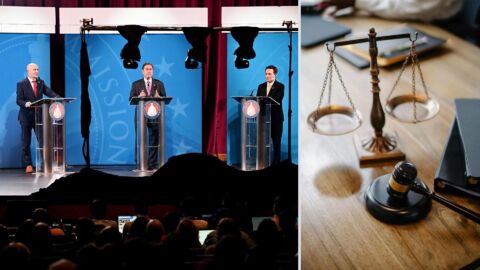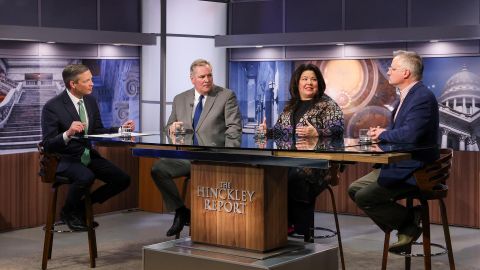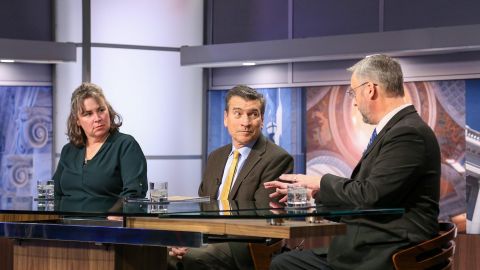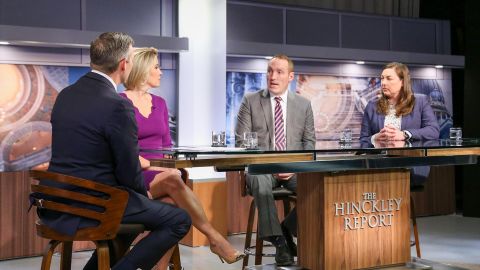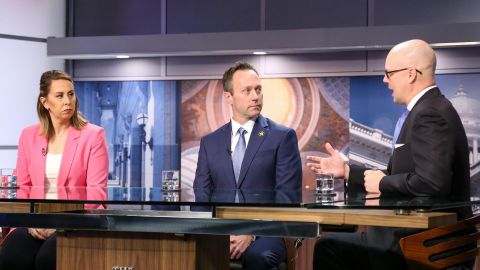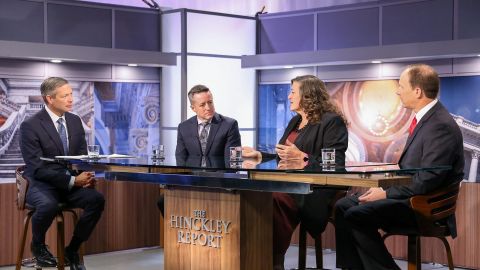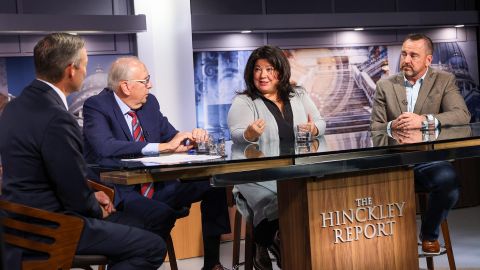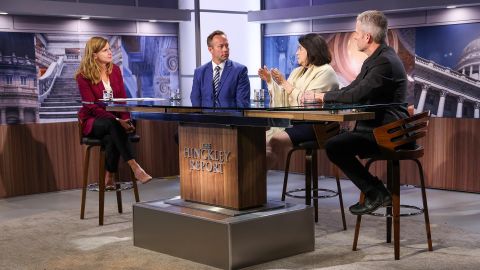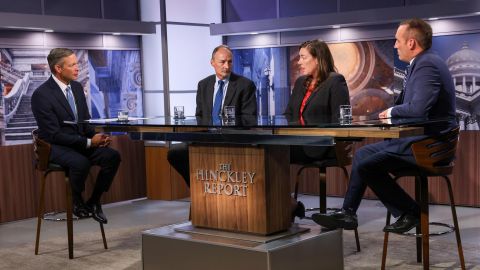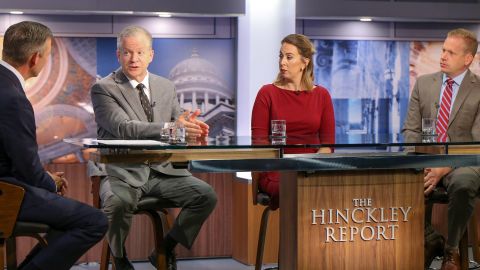announcer: Funding for "The Hinckley Report" is made possible in part by the Cleone Peterson Eccles Endowment Fund.
Jason Perry: Tonight, on "The Hinckley Report."
Mitt Romney makes a dramatic announcement that could have a generational impact on our state.
As the nation faces critical issues, Utah's leaders weigh in.
And new polling reveals what voters are thinking ahead of the 2024 election cycle.
♪♪♪ ♪♪♪ Jason Perry: Good evening, and welcome to "The Hinckley Report."
I'm Jason Perry, Director of the Hinckley Institute of Politics.
Covering the week, we have Ben Winslow, reporter with Fox 13 News; Saige Miller, reporter with KUER; and Frank Pignanelli, political commentator and lobbyist with Foxley and Pignanelli.
So glad you're with us tonight, because this was a huge week in politics.
The ramifications will be felt for a very long time, and we're just getting to those details.
Ben, let's start with you.
Senator Mitt Romney made the announcement we were waiting to know, that he's not running for a second term.
Ben Winslow: It was both a surprise, and yet at the same time, it was not a surprise.
We kind of, you know, we were playing this game for a long time.
Will he, won't he?
Will he, won't he?
And he finally did.
He ripped the band-aid off and, yeah, this is-- shock waves from D.C. to Utah, but at the same time, everybody was kind of expecting it too.
It's weird, when I talk to people about that, people are like, I still can't believe he did it, but I was not surprised that he did it.
Jason Perry: Saige, it's interesting because he made this announcement at a time when his approval ratings are at a three year high.
Republicans were asked whether or not they would vote for him, and, you know, at least 50% of them thought-- said that they would if he were to run again.
It's an interesting time, and why now?
Saige Miller: I think because of his age, he doesn't really necessarily want to be in the nitty-gritty of Washington D.C. anymore.
And he says that he wants-- in the announcement that he made when he said that he was not going to seek reelection, that he wanted the generation-- a younger generation to actually lead instead of him, being in his '80s by the next time he would be running again for re-election.
So, he didn't-- he-- I think he just wants to enjoy the remaining years of his life, and he wants younger folks in a position to actually lead the nation, considering they will be the ones that are alive and making these big decisions.
So, he does want to see the next generation very much so take the torch.
And I was reading this article that by next year, by the next election, 50% of the electoral-- like, 50% of the vote is going to be Gen Z and Millennials.
So, we are seeing this shift in who needs to be in Washington, representing the folks that are gonna be alive and be, like, seeking the repercussions of their decisions and their votes in Washington.
Jason Perry: To this point, Frank, I want to show a clip first to what Saige was just talking about too on this passing the torch and who should be making the decisions, that being the people who are going to be alive at the time when they're-- when the true ramifications are felt.
Let's show this clip from Senator Romney and then your reaction.
Mitt Romney: I think it's time for guys like me to get out of the way and have people in the next generation step forward, because they're going to be shaping the world they're going to be living in.
And over the last couple of decades, people of my age, the Boomers, have done pretty well for ourselves.
We voted for all sorts of benefits and programs for us, and we haven't paid for them.
And I think some of the people that are coming along next want to have a say in how we leave the earth and how they prepare for the future they're going to live in.
Frank Pignanelli: Well, first of all, an important lesson we all learned, do not play poker with Mitt Romney.
And the reason why is because up until a week ago, people who knew him said, "Oh, absolutely, he's going to run," or others say, "No, he's not going to run."
I mean, he held the card so close to his chest and yet sent out different signals.
So, was that what I found it fascinating that he did.
And obviously, he'd been thinking about it from before.
I think what he's trying to do is establish what part of his legacy is, that he's done some great accomplishments, but also he's leaving for the next generation.
But let's be honest, he was in for a fight, and I think that this is a graceful way to say I'm leaving because, and he mentioned President Trump, and he mentioned President Biden, and obviously he was also talking about the age.
This discussion about passing the torch is a way for him to leave gracefully because otherwise he was facing a tough battle.
May have prevailed, but it was gonna be tough hand to hand combat between now and June.
Jason Perry: But what do you make of the sort of the names, you just threw us some of them, whether or not this narrative is going to continue nationally?
So you talk-- he mentioned Trump, and he mentioned Biden, but part of this discussion is McConnell and Pelosi, for example, some of these elected officials that are getting up there in age, and he's kind of referencing those as well.
Is that a narrative we're going to continue to see?
Frank Pignanelli: I think it is a narrative you're going to continue to see, because, as was pointed out, is that you have this new wave of voters coming in, the Gen Z and the Millennials, and they have no affiliation at all with these older politicians.
And so, and it's across the-- so it's, it's Democrats and Republicans.
They're clinging onto this, and they don't have that connection to these younger voters.
So, I think you're gonna see a new rash of voters there.
So, the people are talked about are younger people to replace Romney.
And I think he saw that, he was gonna have to figure that out.
How do I have a connection with younger voter?
It just wasn't worth it.
Moving on.
Ben Winslow: I do wonder how much burnout is going to play into a factor that too, as he goes, he was considering potentially a reelection.
Like you said, he was going to face an intraparty fight, and it was going to be vicious.
Convention, he likely would not have prevailed.
He has been famously booed at the state Republican Party convention.
Likely would have gathered signatures, likely would have made the ballot, you know, potentially could have definitely done very well.
But there were a lot of people lining up to challenge him.
There are a lot of people lining up right now, and this was before he made the announcement.
Jason Perry: I wanna look at this through the lens of some of our students, and Saige, we have a question from one of our students here on campus, Karina, who is looking at this very issue of potential voter in the future, and this is what she's wondering about.
So, let's listen to this question, and then your answer.
Karina Barker: Hello, my name is Karina Barker, and I am a senior at the University of Utah, studying Political Science and International Studies.
It has recently been announced that Senator Romney is not running for re-election for the Senate to make room for the next generation of leaders in this country.
And my question is, what do you think Senator Romney's lasting legacy will be?
Saige Miller: I think Romney has a very long resume.
He was a governor, he ran for president, and now he's the Senator of Utah.
He has a lot to look forward to in saying what he has accomplished.
He prides himself on running a lot of clean elections.
A lot of people couldn't dig up dirt on him, which worked out in his favor a lot of the time.
And I also think that his legacy, well, it could be divisive in some ends, is known for sticking to his guns and, like, voting with his mind and what he believes is right.
I know the Atlantic just came out with an article, McKay Coppins is writing a, like, a book about Mitt Romney.
And, like, in that article, it explains just how hard it was for him to come to the decision to not only vote to impeach President Trump, but also just his feelings around the attack in the Capitol on January 6th and how he felt ostracized by his own party and recognized that there just wasn't a lot of unity and there was a lot of people having a performance on the front side, but then saying something behind closed doors which didn't necessarily align with what President Trump at the time was saying.
And so, I think that he is going to be known very much so for doing what he believes in and what he is, like, what he believes is right and not going along with the performance or sticking along party lines to play the game of politics.
Ben Winslow: He did his own thing, he really did.
He voted on bills that bucked his own party, the impeachment of President Trump twice, and maybe that factored into the decision as well, because the party has changed on him.
He was the flag bearer for president in 2012.
The party is not the same party that when he was leading it and on the ticket.
Now, as he made reference to, you know, President Trump, he called certain factions of the party demagogues, he threw all that out there in his kind of setting fire and walking away speech announcing he was leaving, or at least his news conference there.
The party has changed on him as well, and you kind of wonder how much did he want to be a part of that going forward?
Frank Pignanelli: The one thing that I think, it's kind of taken a more broader view, is that he was essentially drafted and coronated when he first ran.
He walks in with all this political capital.
Now, a lot of politicians who are popular, all they do is they want to protect their political capital.
I think he's going to be a good instruction for future generations of politicians that you can have your political capital and you can spend it and you can do some things.
I go back to D.C. a lot, interact with all the different lobbyists and elected officials.
They like working with him.
And that's why he was able to accomplish a lot.
Both Democrats and Republicans like working with him, so he was able to spend his political capital to get some important things passed.
And that, to me, sets a good legacy that you can, you know, you can walk in the political capital-- you can walk with great political capital if you don't just try to preserve it but spend it, you can accomplish great things.
Jason Perry: Saige, what's interesting in this speech when he made his announcement, Senator Romney said, "I'm not gonna be running again, but I'm going to stay active politically."
Does this political capital that he brought with him extend a little further, given who he is?
Saige Miller: I definitely think that he's not leaving politics for sure.
This man is, like, he's always going, I don't feel like he could just, like, retire and go play golf.
I feel like he still wants to be in the fight, just maybe not in the front of it anymore.
I don't think he really wants to be a part of very strong headlines.
I think that he wants to be behind the doors, helping use that political capital to maybe perhaps grow the next generation of Republican politicians that is away from Trumpism.
I definitely think he wants to move on from this era and then get back to essentially to the basics of what it means to be an establishment Republican.
So, I definitely don't know exactly what that looks like.
I think this race to replace him is going to show a lot about where exactly Utah is going to be postured within Washington D.C., especially because it's a very young delegation now.
The oldest serving person is going to be Mike Lee.
He probably has the most, like, gumption up at the Capitol right now.
But yeah, Celeste Maloy, or the race with Celeste Maloy against Kathleen Riebe, like, that's gonna be a new face.
Burgess Owens is pretty new, so is Blake Moore.
So, it's definitely, like, Utah is losing something there when it comes to a strong voice on-- in Washington.
And we-- he's gonna have to shape to see where that voice remains.
Jason Perry: I wanna bring up an item that Saige mentioned a moment ago for you, Frank, because it's interesting, is there is an article in the Atlantic from McKay Coppins, who gives us a little teaser of a book, a biography, that he has been writing with the help of Senator Romney.
Give us a little preview of what we're going to find, and some say that was maybe one of the real signs that Senator Romney wasn't going to run again is that this book is about to come out.
Frank Pignanelli: Well, I read a preview of it, and I definitely think that's one of the reasons why he's decided to run-- and he just took the hand grenade and tossed it.
And I get it was a bipartisan-- I won't say attack, but a critique of what happens in the Senate, and, you know, his frustration with different senators who felt like who weren't fulfilling their obligations.
But also, he talks about how he's able to piece together different things.
He also talked about his life, how he would eat salmon that Senator Murkowski brought and watch "Ted Lasso."
It is, like, this awful life he had.
Saige Miller: Family wouldn't visit him because they didn't want to be in Washington.
Frank Pignanelli: This awful life, it's so-- but I do think what he does, he talks about the back room of how the senators would laugh at President Trump and things like that.
He was frustrated with the progressives of the Democrats.
So, I do think what it is is, like, I'm leaving, but I want to make sure that when I leave, everyone knows what it was like.
And hopefully it will set the standard of what people can do to change.
Jason Perry: It's interesting-- oh, go ahead, Saige.
Saige Miller: I think also too is that Romney was really kind of having this reckoning of what, like, what it means to be a Republican, specifically on a high level in Washington.
And part of the excerpt that we were reading as well is, like, states that he was working with Joe Manchin of West Virginia to perhaps create a third party because he was just, like, so sick of the divisiveness and didn't believe that any of the colleagues were really following the constitution or even believed in it to begin with.
And so, he was under a lot of turmoil, at least that's what it sounds like in this book, in the excerpt of this book that I actually now want to read, because it was written really well what I did read, and I just-- I think that he wants to do something more, but I don't think he wants to be necessarily in the thick of it.
Jason Perry: Yeah, it's interesting, we'll be reading that with some interest.
Any time you have a snippet that says a quote is, "Morons, I'm surrounded by morons," which is part of this little teaser we get to see, it's gonna be interesting to read that book.
Which leads us to this very interesting question, Ben, because you've done such great reporting on this too, is everyone's wondering now who's going to replace him?
Let's talk about that for a moment.
Ben Winslow: Are you?
Jason Perry: I'm not.
Thank you for the opportunity there, Ben.
Ben Winslow: The name was floated, but no, there's a long list of people, and I think it's growing by the day.
The Utah GOP chair said that previous to Romney's announcement, he had received ten to fifteen calls feeling out chances.
And then you have a couple more after Romney announced, and I have been making calls trying to find out who is and who is not.
Obviously, you have some people, some high profile names who are not.
Utah Attorney General Sean Reyes told me he is not.
Greg Hughes, former House Speaker, told me he is not.
Carolyn Fippin told me she is interested.
You also have Congressman John Curtis kind of putting it out there, maybe, maybe not, little light flirting going on there with the Senate race.
I think you're gonna see a lot of people.
You also have obviously Riverton Mayor Trent Staggs who is already in, and House Speaker Brad Wilson, who has the exploratory committee, which he's very much fundraising and very much pushing toward a run.
And on that one, I'm not sure if he's going to even be speaker by the time January hits because he may just jump in.
Jason Perry: Yeah, hey, talk about that one for a minute, Frank, because Brad Wilson, the Speaker of the House, launched this exploratory committee.
He was-- he kind of walked that line, waiting for the announcement from Senator Romney.
But now that he's made it, what do you expect is going to happen?
Frank Pignanelli: He'll announce in the next two weeks.
He's gonna announce that he's resigning from the legislature, and then he's in.
He's raised over $2 million, he has put an incredible amount of time meeting with local elected officials and things like that.
What's interesting, the two, I don't wanna say front runners, but because you have John Curtis who actually, you know, obviously would be a viable candidate, but the two that have been out there working are local elected officials.
You have Brad Wilson, who has been-- he's been a member of the legislature.
You've had Trent Staggs, who's been, obviously, the mayor of Riverton, and I think what we learned from the race, the special election, is that the local election officials actually, their endorsements play a lot, and these two candidates have been working.
Now, Brad Wilson really has been working very hard with his legislative contacts, and which could be very helpful to him in a not just a delegate fight, but also in a primary fight, which is likely to happen.
So, if Brad Wilson is, in Trent Staggs is in, we're gonna wait for some others.
You could have-- I think you'd have up to ten to twelve candidates in this thing.
Jason Perry: What's likely to happen with that Speaker position?
Not who's going to fill it, but what Brad Wilson will likely do.
Frank Pignanelli: Brad Wilson will resign from the speakership in the next couple of weeks.
The most likely talked about is Mike Schultz, who's the majority leader, will move up, which will create a position in Republican leadership.
And let me tell you, they've already been working on that for the last month or two.
There's a lot of people vying for that.
So, you will have a, a change in the House leadership for the 2024 session.
Jason Perry: There are ramifications of this, for sure.
I wanna talk about the one-- the name that several of you mentioned here, which is interesting, is Congressman John Curtis.
You said he was kind of flirting with this.
I wanna give the tweet that he put out, and Saige, maybe you can comment on this after we show it, because this is his kind of thought that we-- he might be interested in it, but he also wants to make sure his House race is secure.
So, here's what Congressman Curtis tweeted.
He said, "It's encouraging to hear from friends urging me to run for Senate.
Sue & I are grateful for Utahns' trust.
Your appreciation for the work my team and I do in Congress is heartening.
Be it in the House or Senate, there's much to accomplish & I look forward to getting things done."
Saige Miller: The first thing that sticks out to me is that it looks like he's definitely staying in Washington, or at least gonna try and secure a seat in Washington, whether that be in the House or in the Senate.
But I do think that the House is going through a lot right now, and they-- to put it lightly.
Yeah, putting it very lightly of where you have this division within the Republican Party in the house.
You have the Freedom Caucus, and then you have the folks that are not a part of the Freedom Caucus but are still Republican.
And he is just watching this all unfold.
It's really dramatic, it's incredibly chaotic, and perhaps he's hoping that, like, the Senate might be a little bit more tame, or he can get a little bit more done.
But he would also be bringing that experience that already exists into the Senate.
He's already had those relationships, he understands how Washington works, and so if he were to run for the Senate, I do think he'd be an incredibly viable candidate.
And I would actually like to see the race play out between him and Brad Wilson.
Jason Perry: But before we leave it, one thing's interesting, you talked about Sean Reyes telling you he's not going to run, but he did say he would be announcing his support for someone very soon.
It didn't sound like it-- some of those names we just talked about.
Ben Winslow: No, there's certainly a lot of internet rumor going around that Tim Ballard, "Sound of Freedom," Operation Underground Rescue-- Railroad, that could be a name that shows up, could be a wild card in this race.
That film got a lot of buzz, got a lot of-- has a certain faction that very much supports it, so that could be a thing.
I've also heard Lieutenant Governor Deidre Henderson's name floated as a potential candidate.
We'll see.
Jason Perry: Yeah, I heard those names, Boyd Matheson, potentially, another name we know in politics.
We'll watch that one very closely.
And of course, one of the issues that will come up for whoever decides to run for this office is, Frank, an interesting thing happened in Washington D.C., an impeachment investigation.
Talk about what's happening right there when it comes to the Biden administration.
Frank Pignanelli: Well, obviously, the articles of impeachment were not voted on by the whole House, which is usually what happens, the whole House votes to begin impeachment process.
Nancy Pelosi did not go that route in 2019, so although McCarthy is being attacked for just opening up the inquiry, Pelosi did the same thing in 2019, which is-- they didn't have-- she didn't have the votes for the impeachment investigation, and he doesn't either.
So, that's why they're just doing this inquiry, which will probably will lead to a vote on this.
And you heard from Romney, now, there's a lot of senators are saying there's not enough there.
We hope we don't get this, because we don't think there's anything there.
The problem is this.
I'm a federally registered lobbyist, I'm a state registered lobbyist.
And the reason why I think this is catching attention, not just in Washington, but across the country, there was a poll out there.
Majority Americans, they think there's something there.
The reason why there's so much smoke is because you have a relative of the president who was selling his relationship with the president to foreign governments.
If somebody else tried that, someone like me tried that, we would be crucified.
And so, there is this perception, at least amongst the political class, that he's getting separate treatment.
Now, he may not have done anything illegal, and I'm not saying he has, but it's certainly unethical, because you aren't saying that you have this relationship and you can make-- you can have an influence on domestic affairs.
And so, that's why this keeps on going, is because there's a sense of that something's wrong, not just with Congress, but the American people are sensing it.
So, that's what's driving this.
And then you don't have really good messaging from the White House.
He keeps on saying my son's done nothing wrong.
Well, he has.
He was going to sign, you know, a plea deal.
So, the messaging is off here.
So, that's why you see this machination is happening, and they better figure out their messaging, because otherwise it's going to haunt them as they go into the re-election campaign.
Jason Perry: So, to that point, Saige, Hunter Biden did get indicted just this Thursday by federal prosecutors.
Saige Miller: Yeah, he did, and I think that perhaps that would help the impeachment inquiry if they go along with it.
But I think the most important aspect of this is that the inquiry is opened with a very-- no evidence was really found yet.
They're kind of just prodding.
And additionally, we know that McCarthy is kind of at the will of a Freedom-- at the Freedom Caucus to keep his job essentially.
So, I think a lot of this is a kind of posturing, and we've been through this before twice with Trump.
And I think that now it the idea of an impeachment, the impression and the power of it is dwindling a little bit.
It kind of just seems like politics, if I'm being honest, and I don't think that a lot of the American people are gonna tune into it.
I don't think a lot of American people are gonna give a lot of weight to it.
And I think that it's just-- it just seems kind of like another line that's showing the division in Washington.
Jason Perry: Just the final note on this one, Ben, is some of our delegation have weighed in.
Senator Mike Lee was supporting of the investigation.
We had Representative Owens weigh in quite quickly, but also we had Mitt Romney say, "I don't see anything to it, but you're okay to proceed."
Ben Winslow: And Congressman Curtis also kind of said, "I'll just wait and see what happens."
But yeah, stay tuned, really.
This is going to be interesting.
I do think this is going to be a big factor going into the presidential election, and you might even see some trickle down effects here locally in our races.
Frank Pignanelli: Remember, in the 21st century, the three-- the impeachment proceedings that were initiated by the party in power loses power.
Jason Perry: Interesting bit of history right there.
Frank Pignanelli: Starting in 1998, yes.
Jason Perry: Talking about trickle down impacts, Saige, the Republicans in Washington D.C. seem to be saying right now they're going to avoid a government shutdown by the end of this month.
Saige Miller: Yeah, they do this every time.
It just feels like the same dream that we haven't woken up yet from.
And I do think that if Republicans, specifically those running for president right now, are talking a lot about fiscal responsibility, that we are over spending, and then kind of just dragging the horse down the road and not doing anything about it probably is not fixing this problem of our national debt and our deficit.
So, I do think it's also interesting because Chris Stewart, his last day is today in Washington, and that's a pretty big vote, and he was kind of needed to avoid a government shutdown.
And now that seat is going to be vacant for about two and a half months, and, right?
Ben Winslow: There's a lot of votes that might be needed for the House that are not gonna be there now with Congressman Stewart's absence.
Saige Miller: And so, and I don't think that they, like, necessarily recognize a big vote, like a government spending bill, would necessarily matter by the time or, like, be in front of them by the time that Chris Stewart was stepping down.
And I do think it kind of just puts us a little bit in limbo.
We have gone through this before, and usually it's evaded at the very last second or they push it a little bit, do some posturing, do some negotiating, and then the government's open again.
I think the last, like, long shut down we have was when-- was with Trump, and our national parks were also impacted by that, correct?
Ben Winslow: And Utah floated the bill to keep them open.
Saige Miller: Yes.
Jason Perry: They did.
Ben Winslow: But we never got paid back, by the way.
Frank Pignanelli: And no one like-- I mean, look, you have millions of Americans who go to work in October 1, and if the government shut down, they get frustrated.
It's like, we can't-- we know you care about the debt.
What can't you talk about other times of the year and not shut the government down?
It never helps both parties, Washington D.C., to shut the government down, because it impacts people, and they have to go to work, and they get frustrated when they don't see their elected officials working.
Jason Perry: Let's spend the last couple of minutes on an initiative from our governor.
This gets to the more kind of getting along area of politics.
Ben, this Disagree Better Initiative.
Governor Cox, our own governor, is the chair of the National Governors Association, this is the primary initiative, but this week it wasn't just about how do we get along better.
They're also tackling a tough federal issue.
Ben Winslow: Immigration.
No small issue there, right?
This kind of speaks toward the Utah way that we hear a lot about, of, you know, finding ways to find common ground, kind of move policies forward.
I mean, Utah has had its own compact on immigration that's had bipartisan buy in and things like that.
And I think it appears that the governor would like to see if that can translate to a national stage with this whole idea of finding things, finding ways to move forward by finding ways that you can disagree without being necessarily scorched earth on everybody else.
It's an interesting initiative, it is very Utah-like, and it is very on brand for Governor Cox.
I do wonder in these very hyper partisan times how it translates if it can really get that momentum on a national scale.
You can tell there's a certain segment of the population that would like to see this happen, would like to be able to talk to their neighbors without everybody, you know, tearing each other apart.
But you just wonder if it is also-- is it too late?
Have we passed the point of no return?
Jason Perry: Frank, as our one elected official here, formerly elected official, it was interesting at this conference in this last 20 seconds, Rachel Kleinfeld from Carnegie Endowment said, "When polarization becomes a winning political strategy, democracy fails."
Frank Pignanelli: Just-- I don't know if it fails, but it just makes it that much harder.
And because the vast majority of the population, whether it's inside Utah or it's across the country, they don't like the fights.
They just want to get things done.
And I will say this, it's that democracy is built on argument.
You're always gonna have an argument, and when someone says we need to bring the people together, Americans never come together unless it's the times of crisis or emergency.
We're always arguing with each other, and that tells me it's a healthy democracy.
So, I'm glad we're gonna be-- I think we should be nicer to each other, but we need to keep arguing.
Jason Perry: Okay, thank you so much for that insight and the way we had that last conversation is very important.
So, thank you, and thank you for watching "The Hinckley Report."
This show is also available as a podcast on PBSUtah.org/HinckleyReport or wherever you get your podcasts.
Thank you for being with us.
We'll see you next week.
♪♪♪ ♪♪♪





